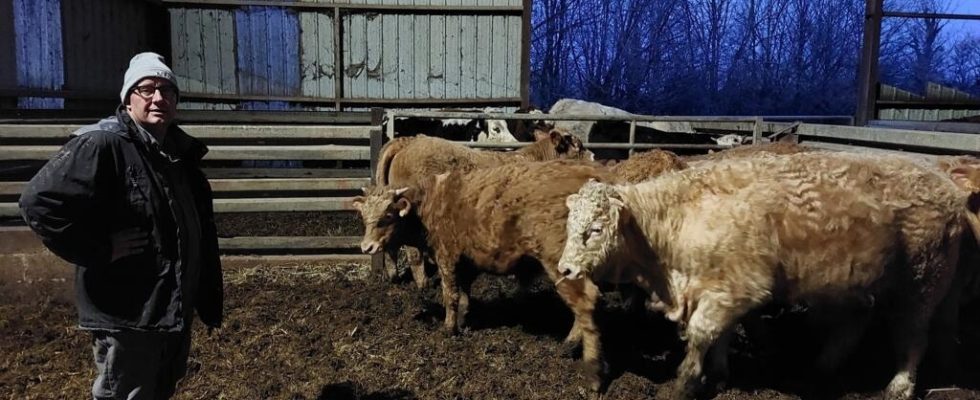Charges too high, diesel too expensive, standards too restrictive… The reasons for the protest by French farmers are numerous and different depending on the operators and regions. Illustration in the village of Critot, in Normandy, where Bertrand Van Elslande has been a farmer and cattle breeder for 27 years.
“ Here is a very concrete example: last year, I had 97,000 euros in expenses, a year before, I had 70,000 », explains Bertrand Van Elslande, balance sheet in hand. At 52 years old, this farmer breeds 70 cattle, “ of suckler cows, a bull, bull calves and heifers », in Critot, near Rouen, in Normandy. He has been working in the profession for 27 years, after several years as an agricultural high school teacher. Today he is almost the owner of the 130 hectares of land he owns.
For several months, its production costs have exploded, particularly the food intended to feed its animals: cereals, potatoes and beets: “ Beets that we sold for 23 euros per tonne three years ago, today they are worth 45 euros per tonne “, he said. The selling price of a kilo of meat may have increased, but the cost of production has followed the same trend. As a result, the breeder considers himself a loser. “ Despite an increase of two euros in the price of meat, which now brings us 1000 euros per animal, we have had an increase of more than 1000 euros in the production cost per animal. So the net profit is lower than what we had before “, he laments.
Rumble against the rise in diesel
At the heart of the anger of French farmers is also the increase in the price of GNR, non-road diesel. Bertrand Van Elslande uses it to power his three tractors and his combine harvester. The bill has doubled over the past year. “ It’s all the worse because we use these agricultural machines all day long. When we do a harvest day for example, the combine harvester is used between 8 and 10 hours per day, which represents 800 liters of fuel consumed per day. “, he says.
The breeder pays himself an income equivalent to the minimum wage. Like others, it also benefits from European aid, via the CAP, the Common Agricultural Policy. The unions demand that it be paid immediately, without any delay. For Bertrand Van Elslande, the CAP represents half of his annual income and a lot of hassle. “ Before, we touched the CAP in two installments. This year, I received it in eight installments, with a late payment of more than three months! Would any French person agree to be paid by their boss a month and a half late and a sum halved in less than 15 years? », he asks himself. And to continue: “ As long as the money coming in is higher than the bills, we’re holding on. When this is not the case, we are forced to draw on private capital to plug the holes. Sometimes, I dread the bills and I ask myself questions, namely: should I continue the job? »
A profession that Bertrand Van Elslande no longer recognizes, in particular because of the administrative burden “ As soon as we do something in the fields, we have to record everything and pay someone more to have it recorded in accordance with what the State requires. When we fill out the papers, we don’t feel like a farmer, we feel more like a secretary and we wonder why our job is a secretarial job and not producing to feed the French. . We will soon have more people in administration than on farms “.
“ I wonder how young people go about giving themselves a career goal », continues Bertrand Van Elslande. Young people are the challenge for the years to come in the agricultural sector, because a third of French farmers will be old enough to retire in ten years.
